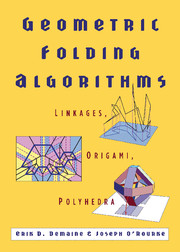Book contents
- Frontmatter
- Contents
- Preface
- 0 Introduction
- Part I Linkages
- 1 Problem Classification and Examples
- 2 Upper and Lower Bounds
- 3 Planar Linkage Mechanisms
- 4 Rigid Frameworks
- 5 Reconfiguration of Chains
- 6 Locked Chains
- 7 Interlocked Chains
- 8 Joint-Constrained Motion
- 9 Protein Folding
- Part II Paper
- Part III Polyhedra
- Bibliography
- Index
7 - Interlocked Chains
Published online by Cambridge University Press: 07 September 2010
- Frontmatter
- Contents
- Preface
- 0 Introduction
- Part I Linkages
- 1 Problem Classification and Examples
- 2 Upper and Lower Bounds
- 3 Planar Linkage Mechanisms
- 4 Rigid Frameworks
- 5 Reconfiguration of Chains
- 6 Locked Chains
- 7 Interlocked Chains
- 8 Joint-Constrained Motion
- 9 Protein Folding
- Part II Paper
- Part III Polyhedra
- Bibliography
- Index
Summary
Having seen in the previous sections that chains can only lock in 3D, it is natural to investigate the conditions that permitchains to lock in 3D. Sections 5.3.3 and 6.9 showed that chains with non-self-intersecting projections cannot lock. In this section we report on the beginnings of an exploration of when chains can lock and, in particular, when pairs of chains can “interlock.” This line of investigation was prompted by a question posed by Anna Lubiw (Demaine and O'Rourke 2000): Into how many pieces must a chain be cut (at vertices) so that the pieces can be separated and straightened? In a sense, this question crystallizes the vague issue of the degree of “lockedness” of a chain—how tangled it is—in the form of a precise problem. The “knitting needles” example (Figure 6.2, p. 88) is only slightly locked, in that removal of one vertex suffices to unlock it (recall that Cantarella and Johnson proved that no chain of fewer than 5 links can be locked).Concatenating many copies of the knitting needles leads to a lower bound of ⌊ (n − 1)/4⌋ on the number of cuts needed to separate a chain of n links, as illustrated in Figure 7.1: each copy of the 5-link chain must have one of its four interior vertices cut. An upper bound of ⌊ (n − 3)/2⌋ has been obtained, but otherwise Lubiw's problem remains unsolved.
- Type
- Chapter
- Information
- Geometric Folding AlgorithmsLinkages, Origami, Polyhedra, pp. 123 - 130Publisher: Cambridge University PressPrint publication year: 2007



